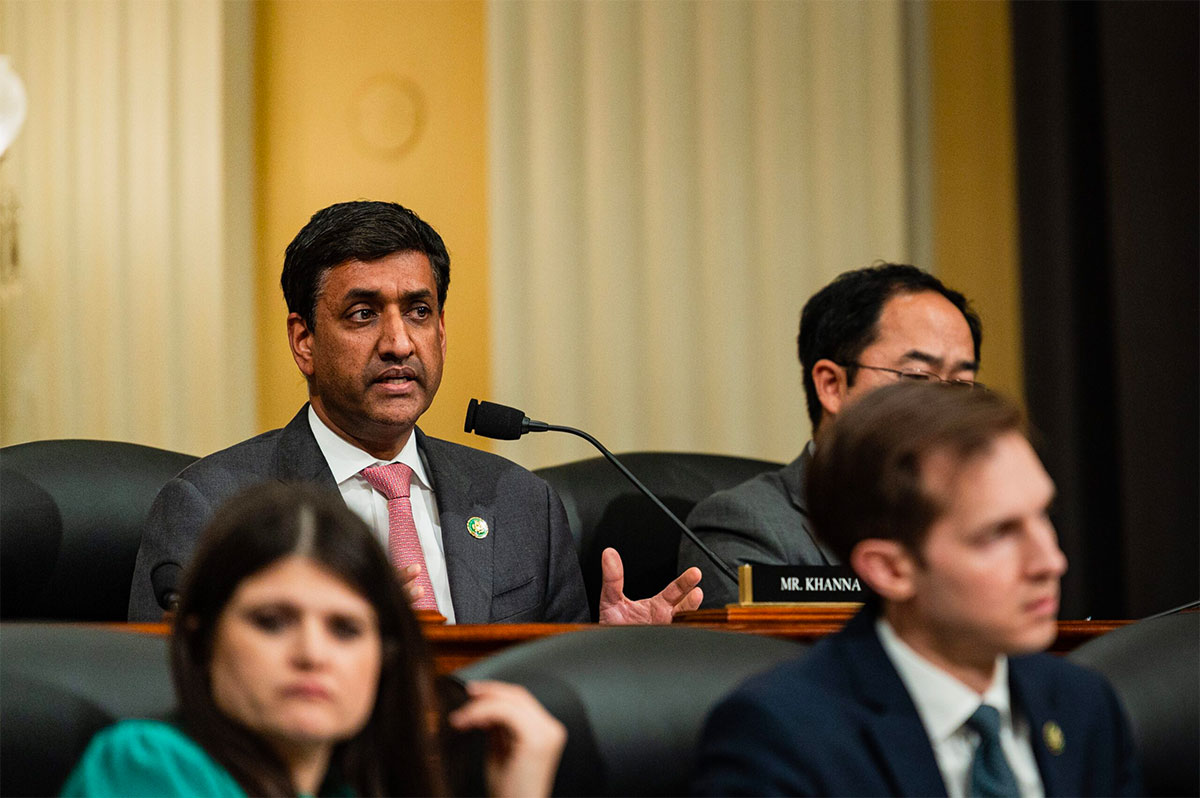The most prominent California leaders at the national stage have either retired, died or stepped back — opening the door for a new generation of leadership to emerge. Rep. Ro Khanna appears to be at the forefront of that movement.
The Silicon Valley congressman has found a unique intersection that combines advocating for tech innovation and investment, while simultaneously introducing progressive policies to ensure those outside the tech sector are not left behind — and his ideas have caught the eye of the nation.
Khanna represents one of the wealthiest districts in the state — if not the entire country. The 17th congressional district, which includes San Jose, Sunnyvale, Cupertino, Santa Clara, Newark, Fremont, and Milpitas, generates an estimated $10 trillion in wealth.
“I come from a district where I have credibility just because of our economy. I am for entrepreneurship. I am for innovation,” Khanna told San José Spotlight. “But I think the income disparity is too deep. Regional inequalities are too deep, and we’ve got to have more progressive taxation, pay workers more, (and) create economic opportunity everywhere, or we’re going to have a massive backlash against wealth concentration.”
The district’s economy outpaces several countries. The tech-heavy Silicon Valley is also a money-making engine that affects the state budget. The region contributes more than 40 percent of personal income-tax revenue to the state, according to the U.S. Bureau of Economic Analysis, and tech behemoths including Apple, Nvidia, Intel, and LinkedIn are housed squarely in Khanna’s district.
This means whoever represents the area cannot be ignored, something Khanna is keenly aware of.

In an exclusive interview with San José Spotlight, Khanna said the nation looks to California to be a leader in two major areas: investing in science and research, as well as the development of technology and manufacturing — particularly clean technologies like solar, wind and geothermal energy sources.
“And then making sure that the opportunities for technology wealth generation are everywhere in the country, not just concentrated in Silicon Valley,” Khanna said.
In his nearly eight years in office, Khanna has emphasized that Silicon Valley must be part of the solution to re-industrializing the nation and support new manufacturing to creates jobs nationwide.
Khanna secured the largest national investment in science funding since the 1960s — at about $230 billion — when he co-authored the Endless Frontier Act, which was later implemented into the 2023 CHIPS and Science Act. The bill created technology hubs across the nation. He stood beside President Joe Biden when the bill was signed.
Khanna has spearheaded public private-partnerships with Google, community colleges and historic Black universities to offer financial assistance, skills training and access to high-paying positions in the technology sector to more than 100 students. The initiative was implemented in eight colleges across the country.
As advancements in artificial intelligence unfold at lightning speed, Khanna is working on legislation to incentivize tech companies to use AI to enhance worker productivity rather than to replace workers.
For Khanna it’s not about demonizing tech, but working with stakeholders in the industry to make sure its benefits are felt far and wide.
“Right now our tax code favors capital expenditure of machines over the hiring of people. You get bigger deductions,” Khanna said. “So we could incentivize the retention of employees in a tax code.”
In Silicon Valley, the stratification of wealth has created an intangible cost of living for those working outside of tech. The region’s population continues to shrink, while homelessness grows. Khanna said the American dream is “out of reach for too many people.”
Khanna said to combat that he is pushing for Congress to pass a $450 billion investment in subsidized housing development and fighting to implement a national living wage.
He is also advocating for free community college, Medicare for all and $60 billion to subsidize child care centers to keep costs at $10 a day for families.
Political observer Larry Gerston said Khanna has become the face of not only California politics, but national politics. He said the passing of Sen. Dianne Feinstein, retirement of Rep. Anna Eshoo and Rep. Nancy Pelosi’s decision to step back as speaker of the House has left a spot primed for someone like Khanna to fill.
“We’re in a position where we’re seeing a changing of the old guard, so to speak,” Gerston told San José Spotlight. “Khanna is one of the young bucks who is out there more than others.”
Khanna sits on Biden’s national advisory board for his reelection campaign and took on the role of co-chairing Rep. Barbara Lee’s Senate campaign. He is also a deputy whip of the Congressional Progressive Caucus, among other leadership positions in the House.
Gerston said Khanna’s progressive policies are going to resonate more with voters in his district because the middle class is falling back instead of rising up with tech profits — and needs support in areas like housing, health care and child care.
Khanna emphasized California has big shoes to fill with the departure of some household political names, but the state has a lot of promising people to live up to their legacies.
“There is a new generation of voices who are steeped in and understand AI, who understand the modern economy (but) who also understand the affordability crisis of young people and how hard it is to buy a house or pay rent or have child care,” Khanna told San José Spotlight. “It’s healthy for democracy to have that renewal of those new voices and it’ll be an exciting time for the state.”
Contact Jana at jana@sanjosespotlight.com or follow @Jana_Kadah on X, formerly known as Twitter.
